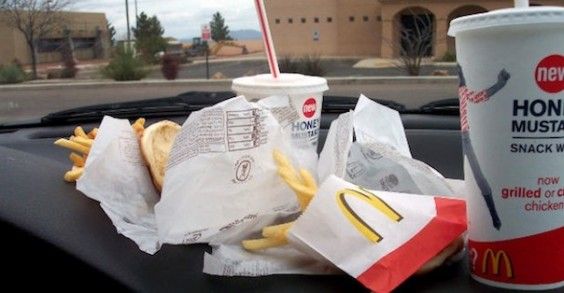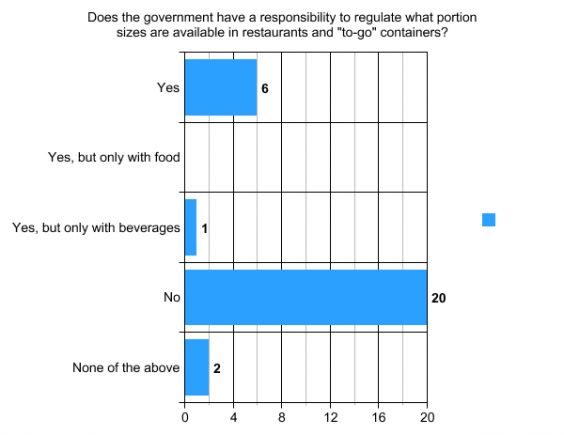New York Mayor Michael Bloomberg’s proposed ban on supersized sodas might have been struck down in court, but it’s likely we haven’t seen the end of his fight against big portions or other hot-button health topics. Mostly recently, he’s jumped on cigarettes in stores and proposed a ban on styrofoam containers.
In the midst of the political hullabaloo, we set out to see what our readers thoughts about the proposed ban, as well as whether the government has the right to control portion sizes (read more and check out our survey here).
We also took the opportunity to poll a portion of our Expert Network for their thoughts on what the government should or shouldn’t do when it comes to American eating habits. So what do some of the brightest minds in fitness, medicine, and psychology have to say? Below is the poll question we sent them, along with the number of responses for each option.
Of the 29 experts we polled, nearly 70 percent think the government doesn’t have the right to regulate portion sizes for food or beverages, no matter the nutritional content. In their responses, however, many emphasized the difference between a governmental “right” and a “responsibility,” emphasizing that it was up to Uncle Sam to educate consumers regarding healthier choices.
While their answers were anonymous, we asked a few respondents to give some more detailed thoughts on the subject. Here’s what they had to say:
Digging Into the Issue
Dr. John Mandrola
Cardiac Electrophysiologist, Healthcare Writer
Despite the great wealth of this country, the health of our citizens sinks lower. It’s hard for humans — biological creatures, evolved over eons — to live in a society filled with excess. One of the great toxins of the modern world is simple sugars. The science here is overwhelming: excess intake of fast-burning carbohydrates wreaks havoc on our bodies.
The government has a role in protecting its citizens. We regulate other similarly toxic substances (alcohol, cigarettes and medicines). I would argue that obesity, driven in part by high-fructose containing drinks, reaches the threshold of government intervention.
Don’t tell me about loss of personal liberty. Curtailing the size of biggie drinks, (or taxing junk food) does not infringe on the pursuit of happiness. No one is saying you can’t eat or drink sugary foods, only that you have to buy them in smaller containers or pay a little extra.
Sugary drinks especially harm our youth. Perhaps this is the strongest argument for regulation of junk food and drink. When a child starts life with diabetes and obesity, this should be a national emergency. We won’t let our kids attend school without vaccines for fear of infectious disease; why are we so cavalier about diabetes and high blood pressure?
Dr. James Hardeman
Doctor of Internal Medicine, Author
Should government regulate the portion sizes of meals? Maybe it’s the libertarian streak in me, but I would vote no. Public policies regarding health can be simplified, however, to the competing interests of personal freedom versus infringing on the rights of others. Sometimes the decision is easy; secondhand smoke, for example, is not only a nuisance but also a health hazard, so smoking restrictions are reasonable. One might contend that unhealthy eating is an individual choice that is no one else’s business.
However, unhealthy people require more of the collective health care dollar and could, therefore, be infringing on the rights of others. Rather than regulate portion sizes, I think the government should help the population make better decisions by education and posting of calorie/saturated fat contents of restaurant foods. Should we be taxing all unhealthy foods and using the money to directly pay for health care? Well, that is an intriguing but whole other story altogether.
Victor Jimenez
Cylcing Instructor, Cylcing360 Media
Regulating portion sizes to address America’s obesity epidemic is completely off the mark. While I do think that the government can and should have a role in solving the problem, smaller portions sizes is just not going to do it. If we can empower people with knowledge they can make better decisions. Teach them how to cook, eat in a health way, and incorporate activity into their lives and we can see change. Just eating smaller portions of the same garbage food will do little to solve the problems of obesity and type 2 diabetes.
In the past, the government regulated alcohol during prohibition. That didn’t work so well. I can just see it now, go the a pizza place. In the front room you have small slices of pizza and your small sugary sodas. Go through he secret back door where they serve the giant slices while you sit in a lazy boy recliner.
Rob Sulaver
Personal Trainer, Founder of Bandana Training
I think the government has a huge responsibility to help us make healthier decisions, but regulating portion size is not a part of that obligation. I believe that consumer education is a much more effective form of regulation than legislation. Don’t tell people they can’t do something, teach them that doing it is a really terrible idea. Guidance is our answer. Restriction is not.
Lindsey Joe
Dietician, Food Industry Consultant
In short, we need to take more accountability and responsibility for the decisions we make that affect our health, in this instance portions sizes. It’s like most other things in life you learn and practice day to day to get by, such as driving a car or writing a check. Well, it’s the same for food — not all things are created equal, and you have to be open to learning why that is and then figure out what best fits your lifestyle (including finding the right people, perhaps it’s Greatist, to help you figure it out).
I want to make the call that’s best for me so why should it be any different with how much I eat and drink? It’s also inappropriate because everyone in this world isn’t 5’11” & 170 lbs. — meaning that portion sizes aren’t universal for everyone and their personal goals (while not the typical, not everyone is trying to lose weight, believe it or not). You have voice and an opinion; use it.
Do you think the government has a role in regulating portions? Let us know your thoughts by commenting, tweeting @Greatist, or heading over to our brand new Greatist Community forums!


